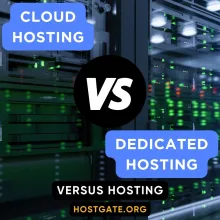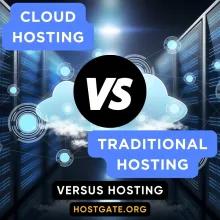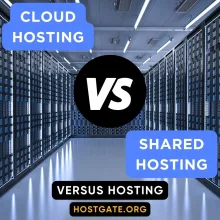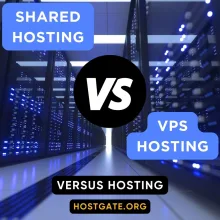Cloud Hosting vs VPS Hosting – Which One is Better? | HostingVS
VPS and Cloud hosting represent two distinct approaches to modern web hosting solutions, each with unique advantages and limitations. Cloud hosting utilizes a network of interconnected servers for dynamic resource distribution, offering exceptional scalability and 99.99% uptime, making it ideal for businesses with fluctuating traffic patterns. VPS hosting divides physical servers into independent virtual environments with dedicated resources, providing predictable performance and complete control but limited scalability.
While cloud hosting operates on a pay-as-you-go model suitable for variable resource needs, VPS hosting offers fixed monthly fees for easier budgeting. Security-wise, cloud hosting provides distributed security measures but may raise compliance concerns, whereas VPS hosting allows complete control over security protocols. The choice between the two depends on specific business requirements, including technical expertise, budget constraints, scalability needs, and compliance requirements.

 Experience the Most Affordable and Reliable Cloud Web Hosting Cloud Web Hosting Starting at Just $3.99/month! - Unlimited Storage & Traffic - Free Domain Included - 24/7 Expert Support - Dedecated & VPS Hosting Plans |
Cloud Hosting VS VPS Hosting | Cloud Hosting | VPS Hosting |
Scalability & Resource Management | Instant scaling up/down of resources on demand | Fixed resources allocated upfront |
Architecture & Reliability | Distributed across multiple servers | Single physical server divided virtually |
Control & Customization | Limited deep system access • Automated management • Provider handles most configurations • Less technical expertise required | Full root access |
Performance & Security | Performance varies based on network load | Consistent predictable performance |
Cost Structure & Pricing | Pay-as-you-go flexible pricing | Fixed monthly pricing |
VPS Hosting vs Cloud Hosting: Complete Comparison
In today’s digital landscape, choosing the right hosting solution is crucial for business success. The cloud computing market is expected to reach unprecedented heights, with projections showing dramatic growth from hundreds of billions to multiple trillions in market valuation over recent years. This remarkable expansion reflects the increasing demand for reliable, scalable hosting solutions. The two major contenders in this space are Virtual Private Server (VPS) hosting and Cloud hosting, each offering distinct advantages and potential drawbacks for different use cases.
Cloud Hosting: Architecture and Capabilities
Cloud hosting leverages a network of interconnected servers to distribute resources dynamically. This architecture enables websites and applications to draw power from multiple servers simultaneously, ensuring consistent performance and reliability. The key advantage lies in its ability to scale resources instantly based on demand, making it ideal for businesses with fluctuating traffic patterns. However, this flexibility comes at a cost – cloud hosting can become expensive when resource usage spikes unexpectedly, and some organizations may find the pricing models less predictable than traditional hosting options.
VPS Hosting: Traditional Yet Powerful
VPS hosting divides a physical server into multiple virtual environments, each operating independently with dedicated resources. This approach provides a middle ground between shared and dedicated hosting, offering guaranteed resources and root access for complete control. While VPS hosting excels in providing predictable performance and costs, its main limitation lies in scalability – resources are generally fixed and scaling requires manual intervention, potentially causing downtime during upgrades.
Performance and Reliability Comparison
When it comes to performance, both solutions offer distinct advantages. Cloud hosting typically delivers superior uptime due to its distributed nature – if one server fails, others in the network automatically take over. VPS hosting, while reliable, may experience downtime during hardware issues since it’s tied to a single physical server. However, VPS often provides more consistent performance as resources are dedicated rather than shared across a network. According to recent studies, cloud hosting maintains an average uptime of 99.99%, while VPS typically offers 99.95% uptime.
Cost Considerations and ROI
The pricing models between these solutions differ significantly. Cloud hosting operates on a pay-as-you-go model, which can be more cost-effective for businesses with variable resource needs. VPS hosting typically charges fixed monthly fees, making budgeting more straightforward but potentially less efficient for scaling operations. Hidden costs can impact both solutions – cloud hosting may incur unexpected charges during traffic spikes, while VPS might require additional investment in management and maintenance tools.
Security and Compliance Implications
Security remains a critical concern for both hosting types. Cloud hosting benefits from distributed security measures and often includes advanced DDoS protection. However, data being spread across multiple servers can raise compliance concerns in certain industries. VPS hosting offers more straightforward security management with complete control over security protocols, but requires more hands-on management and expertise to maintain proper security measures.
Scalability and Resource Management
The stark difference in scalability capabilities defines these hosting solutions. Cloud hosting excels in providing instant resource scaling, allowing businesses to handle sudden traffic spikes efficiently. VPS hosting, while more limited in scalability, offers predictable resource allocation and performance. Recent data shows that 78% of businesses cite scalability as their primary reason for choosing cloud hosting over VPS solutions.
Technical Control and Customization
VPS hosting provides superior control over the server environment, allowing users to customize everything from the operating system to security configurations. This level of control makes it ideal for developers and technically proficient users. Cloud hosting, while offering extensive features, sometimes limits deep technical customization in favor of automated management and ease of use.
Support and Maintenance Requirements
Maintenance needs differ significantly between these solutions. Cloud hosting typically requires less technical expertise as providers manage most server-side operations. VPS hosting demands more technical knowledge and hands-on management, though many providers now offer managed VPS services to bridge this gap. Support quality varies by provider rather than hosting type, but cloud services generally include more comprehensive automated monitoring and management tools.
Future Trends and Evolution
Looking ahead to 2025 and beyond, both hosting solutions continue to evolve. Cloud hosting is incorporating edge computing capabilities and enhanced AI-driven management tools, while VPS providers are implementing more automated scaling features and improved container support. The trend shows a gradual convergence of features, with both solutions adopting each other’s strengths while maintaining their core benefits.
Making the Right Choice
The decision between VPS and cloud hosting ultimately depends on specific business needs. Cloud hosting suits organizations requiring scalability and minimal management overhead, particularly those with variable resource needs. VPS hosting remains ideal for businesses needing predictable costs and complete control over their server environment. Consider factors like technical expertise, budget constraints, scalability requirements, and compliance needs when making this crucial decision.
Both cloud and VPS hosting solutions continue to mature and evolve, offering businesses more options and capabilities than ever before. Understanding the strengths and limitations of each approach enables organizations to make informed decisions that align with their operational needs and growth objectives.
Summary and FAQs
What is the main difference between VPS hosting and Cloud hosting in terms of scalability?
Here’s the key difference between VPS and Cloud hosting in terms of scalability:
VPS Hosting Scalability:
- Uses fixed resources allocated from a single physical server
- Scaling requires manual intervention and planning
- May experience downtime during resource upgrades
- Resources are pre-allocated and guaranteed
- Changes to resources typically require a server restart
- Better suited for stable, predictable workloads
- Limited by the capacity of the physical host server
Cloud Hosting Scalability:
- Resources can be scaled instantly and automatically
- Draws power from multiple servers simultaneously
- No downtime during scaling operations
- Can handle unexpected traffic spikes effectively
- Resources can be adjusted up or down based on real-time demand
- Perfect for variable or growing workloads
- Almost unlimited scaling potential due to distributed infrastructure
The fundamental distinction lies in flexibility and automation. While VPS hosting provides a more rigid but predictable resource allocation that requires manual adjustment, cloud hosting offers dynamic, on-demand scaling that can automatically adapt to changing needs without intervention. According to the article, this key difference is so significant that 78% of businesses cite scalability as their primary reason for choosing cloud hosting over VPS solutions.
Which hosting solution provides better cost predictability – VPS or Cloud hosting?
Here’s a detailed breakdown of cost predictability between VPS and Cloud hosting:
VPS Hosting Cost Predictability:
- Fixed monthly fees with clear pricing structure
- Dedicated resources at a set price
- More straightforward budgeting process
- No surprise charges for traffic spikes
- Additional costs may come from:
- Management tools
- Maintenance requirements
- Technical support needs
- Hardware upgrades when needed
Cloud Hosting Cost Predictability:
- Pay-as-you-go pricing model
- Variable costs based on actual resource usage
- Can have unexpected charges during traffic spikes
- Costs fluctuate with demand
- May become expensive during high-traffic periods
- Harder to predict monthly expenses
- Better cost efficiency for variable workloads
In terms of cost predictability, VPS hosting provides better predictability overall. The fixed monthly fee structure makes it easier for businesses to plan their budgets and know exactly what they’ll be paying each month. Cloud hosting, while potentially more cost-effective for certain use cases, has less predictable costs due to its consumption-based pricing model.
For businesses prioritizing stable, predictable hosting costs over dynamic resource scaling, VPS hosting would be the more suitable choice. However, for organizations with variable resource needs who are willing to trade cost predictability for scalability, cloud hosting might still be more cost-effective in the long run despite its less predictable nature.
How do VPS and Cloud hosting compare in terms of uptime and reliability?
Here’s a detailed comparison of uptime and reliability between VPS and Cloud hosting:
Cloud Hosting Uptime & Reliability:
- Achieves approximately 99.99% uptime
- Higher reliability due to distributed server network
- If one server fails, others automatically take over
- No single point of failure
- Built-in redundancy across multiple servers
- Automatic failover capabilities
- Better handles hardware failures without service interruption
- More resilient during DDoS attacks
VPS Hosting Uptime & Reliability:
- Achieves approximately 99.95% uptime
- Tied to a single physical server
- May experience downtime during:
- Hardware issues
- Server maintenance
- Resource upgrades
- Hardware failures
- More consistent performance due to dedicated resources
- No resource competition with other users
- More vulnerable to physical server failures
In terms of pure uptime and reliability, cloud hosting has a slight edge with its 99.99% uptime compared to VPS’s 99.95%. The key advantage of cloud hosting lies in its distributed architecture, which provides better redundancy and automatic failover capabilities. However, VPS hosting often provides more consistent performance when the system is running, since resources are dedicated rather than shared across a network.
The difference of 0.04% in uptime might seem small, but it translates to about 21 minutes less downtime per month with cloud hosting, which can be crucial for business-critical applications. and typically involves larger upgrade steps.
Which hosting type offers better security and compliance features?
Here’s a comprehensive comparison of security and compliance features between the two hosting types:
VPS Hosting Security & Compliance:
- Provides complete control over security protocols
- Easier to implement specific security measures
- Better suited for industries with strict data location requirements
- Requires more hands-on security management
- Resources are isolated from other users
- Security depends heavily on in-house expertise
- Clearer data location and sovereignty
- More straightforward audit trails
- Better for companies needing full control over security policies
Cloud Hosting Security & Compliance:
- Features distributed security measures
- Includes advanced DDoS protection by default
- Data spread across multiple servers
- May raise compliance concerns in regulated industries
- Often includes built-in security tools
- Automated security updates
- Potential challenges with:
- Data sovereignty
- Data location tracking
- Compliance auditing
- Multi-tenant security
The answer to which is “better” depends on specific needs:
- For organizations requiring complete control over security protocols and data location, VPS hosting offers better security features
- For businesses needing automated security management and built-in DDoS protection, cloud hosting provides better security features
- For compliance-heavy industries (healthcare, finance), VPS hosting often provides better compliance features due to clearer data sovereignty
- For general business applications with standard security requirements, both options can be equally secure when properly configured
The key difference isn’t necessarily in the level of security but in how security is managed and implemented. VPS offers more control but requires more expertise, while cloud hosting provides more automated security features but less direct control.
For businesses with limited technical expertise, which hosting solution would be more suitable?
Here’s a clear analysis of which hosting solution is more suitable for businesses with limited technical expertise:
Cloud Hosting Suitability:
- Requires less technical expertise
- Most server-side operations are managed by providers
- Includes automated management tools
- Built-in monitoring systems
- Automatic updates and maintenance
- User-friendly control panels
- Automated scaling and resource management
- Provider handles most technical complexities
VPS Hosting Suitability:
- Demands more technical knowledge
- Requires understanding of:
- Server administration
- Operating system management
- Security configurations
- Resource monitoring
- System maintenance
- Managed VPS options are available but at higher cost
- Needs expertise for optimization and troubleshooting
- More complex initial setup
For businesses with limited technical expertise, Cloud Hosting would be the more suitable choice. It offers a more user-friendly approach with automated management and less need for technical intervention. The provider handles most of the complex technical aspects, allowing businesses to focus on their core operations rather than server management.
However, if a business with limited technical expertise still prefers VPS hosting, they should consider managed VPS services, where the provider handles the technical aspects for an additional cost. This option provides the benefits of VPS hosting without requiring extensive in-house technical expertise.





